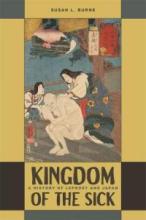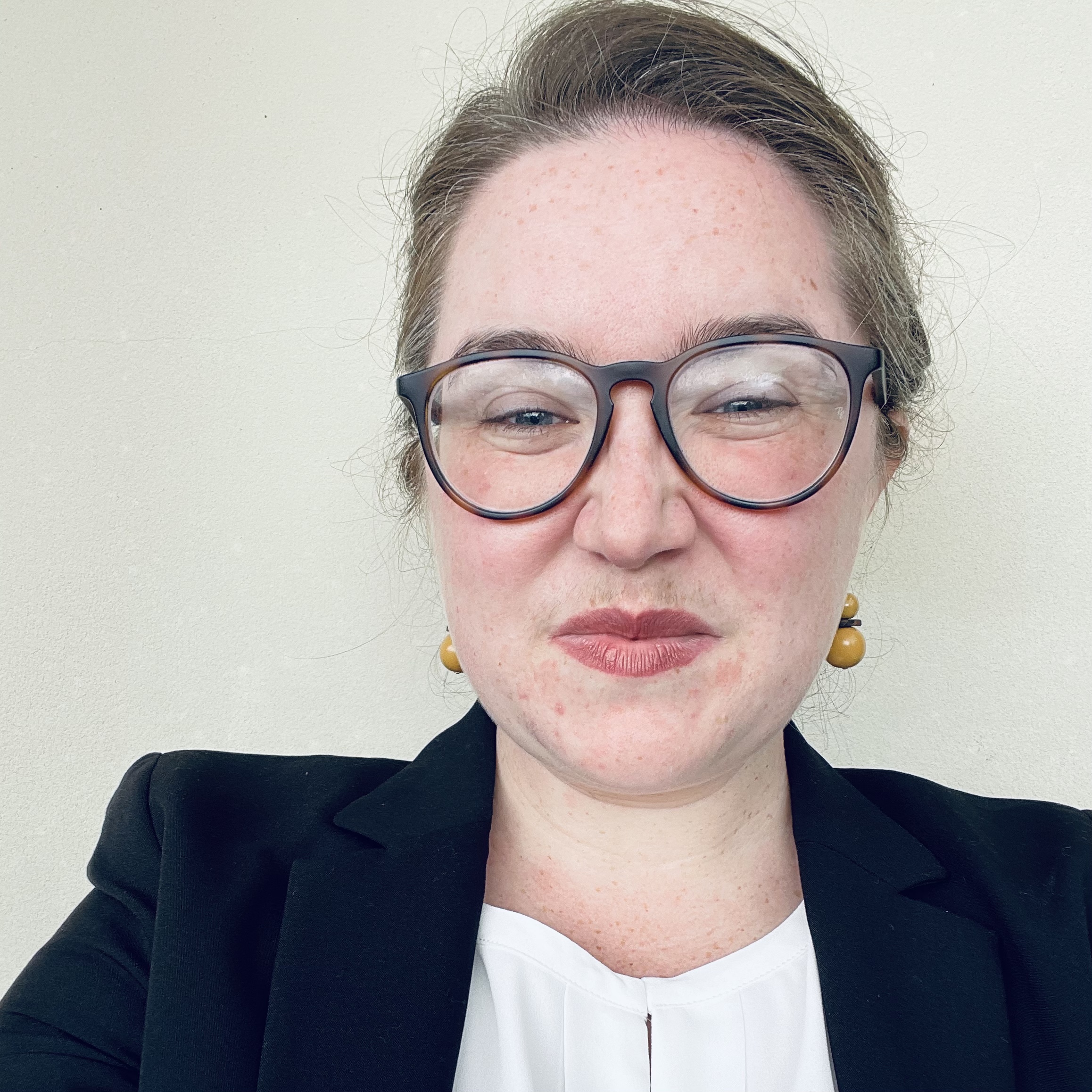
Princeton University, PhD '18
BIOGRAPHY
Emily Kern is a historian of science, with a specialty in the intellectual and cultural history of anthropology, evolution, and the life sciences. Her research and teaching focus on the relationship between the production of scientific knowledge and the production of global political power in the nineteenth and twentieth centuries.
Her current book project, The Cradle of Humanity: Science and the Making of African Origins, explores how the African continent became the “cradle of humankind” and the pre-eminent site for human evolutionary research that it is today. Until the 1950s, it was generally believed that the human species first evolved in Asia, not Africa—an idea that was deeply rooted in European intellectual traditions and continued to draw historians and scientists to the archive, the laboratory, and the Asian field well into the twentieth century. The Cradle of Humanity argues that the story of humanity’s African origin is linked necessarily with the transformation of Africa itself as an object of historical and scientific inquiry. Foregrounding the changing geography of human origins in this history also makes clear that ideas about where humankind emerged often came before explanations for how evolution functioned, and that ideas about place, race, and world history shaped how scientists thought about biological mechanisms and the human species.
She is also the editor with Alison Bashford (UNSW) and Adam Bobbette (Glasgow) of New Earth Histories: Geo-Cosmologies and the Making of the Modern World (Chicago 2023). Situated at the intersection of the history of the earth
and environmental sciences, New Earth Histories explores the significance of multiple ideas of geological time and cosmological systems for the production of global modernity. She is also beginning work on a second project exploring the contemporary construction of the racial identity of Neanderthals against the long history of the disputed place of Neanderthals in the human evolutionary lineage since the discovery of the first Neanderthal remains in 1856 and the first complete skeletal analysis in 1908.
Kern earned her BA at the University of Pennsylvania and her PhD at Princeton University in 2018. Her dissertation won the 2019 DHST dissertation prize from the International Union of History and Philosophy of Science and Technology. Before coming to Chicago, she was a postdoctoral research fellow in the New Earth Histories Research Program at the University of New South Wales in Sydney, Australia.
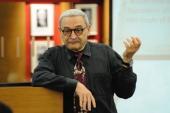
Prof. Hevia has retired and no longer directs BA theses or accepts new graduate students.
University of Chicago, PhD '86
BIOGRAPHY
James Hevia's research has focused on empire and imperialism in eastern and central Asia. Primarily dealing with the British Empire in India and southeast Asia and the Qing empire in China, the specific concerns have been with the causes and justifications for conflict; how empire in Asia became normalized within Europe through markets, exhibitions, and various forms of public media; and how the events of the nineteenth century are remembered in contemporary China. Both Cherishing Men from Afar (1995) and English Lessons (2003) focus on these issues. Subsequent research has centered on how the British in India developed and became dependent upon the production of useful knowledge about populations, geography, and pack animals to maintain their Asian empire. The first part of this project deals with military intelligence and appears in The Imperial Security State (2012). The second part of the project addresses military logistics, the uses of pack animals in warfare, the emergence of tropical veterinary medicine, and the physical transformation of the Punjab as a resource for supporting a security regime in northwest India. These subjects are taken up in Animal Labor & Colonial Warfare (2018). The third part of the project, now underway, considers the impact on India of new agricultural sciences that emerged at the end of the nineteenth century in Europe and the United States. Imperial Pests will focus attention on applied or economic botany and entomology and demonstrate how “constructive colonialism” in India situated imperial development projects in a global scientific network. It will specifically address the war on insect and weed “pests” and the long-term ecological impact on post-colonial nations-states in South Asia.
Recent Research / Recent Publications
Animal Labor & Colonial Warfare. Chicago: University of Chicago Press, 2018.
The Imperial Security State: British Colonial Knowledge and Empire-building in Asia. Cambridge: Cambridge University Press, 2012.
Yingguode Keye: Shijiu Shiji Zhongguo de Diguo Zhuyi Jiaocheng (English Lessons). Translated by Liu Tianlu. Beijing: Shehui kexue wenxian chubanshe, 2007.
English Lessons: The Pedagogy of Imperialism in Nineteenth-Century China. Durham, NC: Duke University Press and Hong Kong University Press, 2003.
Cherishing Men from Afar: Qing Guest Ritual and the Macartney Embassy of 1793. Durham, NC: Duke University Press, 1995. Chinese translation: Huairou yuanren. Beijing: Social Sciences Publishing House, 2002.
- Winner of the 1997 Joseph R. Levenson Book Prize, Association for Asian Studies.
"Tribute, Asymmetry, and Imperial Formations: Rethinking Relations of Power
in East Asia." In Past and Present in China's Foreign Policy, edited by John E. Wills. Portland, MN: Merwin Asia, 2011.
"Small Wars and Counterinsurgency." In Anthropology and Global Counterinsurgency, edited by John D. Kelly et al., 169–177. Chicago: University of Chicago Press, 2010.
"Tribute, Asymmetry, and Imperial Formations: Rethinking Relations of Power
in East Asia." Journal of American-East Asian Relations, special edition, From "Tribute System" to "Peaceful Rise": American Historians, Political Scientists, and Policy Analysts Discuss China's Foreign Relations 16, no. 1–2 (Spring–Summer 2009): 69–83.
"'The ultimate gesture of deference and debasement': Kowtowing in China." The Politics of Gesture: Historical Perspectives 203 (2009): 212–234.
"The Photography Complex: Exposing Boxer China, Making Civilization (1900–1901)." In Photographies East: The Camera and its Histories in East and Southeast Asia, edited by Rosalind Morris, 79–119. Durham, NC: Duke University Press, 2009.
"Plunder, Markets, and Museums: The Biographies of Chinese Imperial
Objects in Europe and North America." In What’s the Use of Art? Asian Visual and Material Culture in Context, edited by Morgan Pitlka, 29–141. Honolulu: University of Hawai’i Press, 2007.
"Rulership and Tibetan Buddhism in Eighteenth-Century China: Qing Emperors, Lamas and Audience Rituals." In Medieval and Early Modern Rituals: Formalized Behavior in the East and West, edited by Joelle Rollo-Koster, 279–302 Leiden: E.J. Brill, 2002.
"World Heritage, National Culture, and the Restoration of Chengde." Positions 9, no. 1 (2001): 219–244.
"Looting Beijing, 1860, 1900." In Tokens of Exchange, edited by Lydia Liu, 192–213. Durham NC: Duke University Press, 1999.
"The Archive State and the Fear of Pollution: From the Opium Wars to Fu-Manchu." Cultural Studies 12, no. 2 (1998): 234–264.
"Leaving a Brand on China." In Formations of Colonial Modernity in East Asia, edited by Tani E. Barlow, 113–140. Durham, NC: Duke University Press, 1997.
"Imperial Guest Ritual: A Translation and Introductory Comments." In Religions of China, edited by Donald Lopez, 471–487. Princeton, NJ: Princeton University Press, 1996.
"An Imperial Nomad and the Great Game: Thomas Francis Wade in China." Late Imperial China 16, no. 2 (1995): 1–22.
-
Named a 2015–16 National Humanities Center Fellow
-
Discusses "The Afterlives of Ruins: The Yuanmingyuan in China and the West" at the University of Chicago Center in Beijing [video, 66 minutes]

University of Chicago, PhD '94
BIOGRAPHY
I am a historian of Japan's "long" nineteenth century (1780s–1910s). I am interested in the social history of intellectual and cultural practices and the continuities and ruptures between what conventional periodization terms Japan's "early modern" and "modern" eras. My first book, Before the Nation: Kokugaku and the Imagining of Community in Early Modern Japan (Duke, 2003) examined the nativist discourse of the late Tokugawa period. It traced the efforts of early nineteenth century intellectuals to define the nature of "Japan" as a locus of personal and cultural identity and the appropriation of aspects of this discourse by modern scholars who sought to define the contours of modern Japanese nationalism.
With the completion of this project I turned to a new set of questions related to the history of the body as it came to be conceptualized within medical and legal discourses. My second monograph, Kingdom of the Sick: Leprosy, Citizenship, and Japan (University of Hawaii Press, 2019) explores the long history of leprosy in Japan from the late medieval period when it was identified as a "karmic retribution disease" to the modern period when attempts to control the disease prompted the creation of a system of public sanitaria. I argue that in the modern era leprosy, a particularly stigmatized disease, became the object of an intense debate on the place of the chronically ill and disabled within the Japanese nation.
Gender is an important category of analysis within my work and I have a long-standing interesting in issues of reproductive health and reproductive rights. Together with Barbara Brooks, I co-edited Gender and Law in the Japanese Imperium (Hawaii, 2014). I authored the introduction and contributed an essay that examined the criminalization of abortion and infanticide in late nineteenth-century Japan.
I am currently working on two additional monographs. The first explores the intellectual and professional world of an early modern doctor who practiced in the villages in Akita in the 1830s and '40s. It seeks to explore the impact of new forms of knowledge, techniques, and materia medica for medical practice and considers the implications of the "medical revolution" of the early nineteenth century for the state-sponsored introduction of Western biomedicine after 1870. The second builds on my research on medical commodities, alternative therapies, and psychiatric practice and explores the impact of the new medical marketplace on ideas about mental health in Japan from c. 1880–1940.
In recent years, I have become interested in the use of digital tools for historical research, specifically ArcGIS and text mining. I utilized ArcGIS in my research on leprosy to explore the place of private leprosy hospitals and clinics in the cityscape of late nineteenth-century Tokyo. I am working on a digital project called "Mapping Medical Tokyo" that seeks to visualize and analyze the spatial dimensions of health, disease, and medical care in the Meiji-era city.
My work has been supported by the Fulbright-Hays Fellowship, the IIE Fulbright, the Japan Foundation, the Japan Society for the Promotion of Science, and the National Endowment for the Humanities.
Courses
-
Gender and Sexuality in World Civilizations (undergraduate)
-
Edo/Tokyo: Society and the City in Japan (undergrad/grad)
-
Medicine and Culture in East Asia (undergrad/grad)
-
Contact Zones: Treaty Ports in Nineteenth Century Japan (undergrad/grad)
-
Gender and Japanese History (undergrad/grad)
Recent Research / Recent Publications
-
Kingdom of the Sick: A History of Leprosy and Japan. Honolulu: University of Hawaii Press, 2019.
-
Gender and Law in the Japanese Imperium, co-editor with Barbara J. Brooks. Honolulu: University of Hawaii Press, 2014.
-
Before the Nation: Kokugaku and the Imagining of Community in Early Modern Japan. Durham, NC: Duke University Press, 2003.
-
"The Japanese Patent Medicine Trade in East Asia: 'Women's Medicines and the Tensions of Empire." In Gender, Health, and History in East Asia, edited by Izumi Nakayama and Angela Leung. Hong Kong: Hong Kong University Press, 2018.
-
"History, Testimony, and the Afterlife of Quarantine: The National Hansen's Disease Museum of Japan." In Quarantine: Local and Global Histories, edited by Alison Bashford, 210–29. London: Palgrave, 2016.
-
"A Village Doctor Reads the Shang Han Lun: Medical Empiricism in Late Tokugawa Japan." In Antiquarianism, Language, and Medical Philology, edited by Benjamin Elman, (Leiden: Brill, 2015).
-
"Rethinking 'Leprosy Prevention': Entrepreneurial Doctors, the Meiji Press, and the Civic Origins of Biopolitics." Journal of Japanese Studies 38, no. 2 (Sum. 2012): 297–323.
-
"Marketing Health and Beauty: Advertising, Medicine, and the Modern Body in Meiji-Taisho Japan." In East Asian Visual Culture from the Treaty Ports to World War II, edited by Hans Thomsen and Jennifer Purtle, 179–202. (Chicago: Paragon Books, 2009).
-
"Marketing 'Women's Medicines': Gender, OTC Herbal Medicines, and Medical Culture in Modern Japan," Asian Medicine 7, no.1 (2009).
-
“Nanayama Jundō at Work: A Village Doctor and Medical Knowledge in Nineteenth-Century Japan.” East Asian Science, Medicine, and Technology 29 (Aut. 2008): 61–82.
-
Publishes Kingdom of the Sick: A History of Leprosy and Japan (Hawaii Press, 2019)
-
Co-edits Gender and Law in the Japanese Imperium (Hawaii, 2014) with Barbara J. Brooks
-
Discusses the history of leprosy in Japan on ABC Radio Australia [15 mins]

University of Cambridge, PhD '92
BIOGRAPHY
Adrian Johns is the author of The Science of Reading: Information, Media, and Mind in Modern America (Chicago, 2023), Death of a Pirate: British Radio and the Making of the Information Age (Norton, 2010), Piracy: The Intellectual Property Wars from Gutenberg to Gates (Chicago, 2009), and The Nature of the Book: Print and Knowledge in the Making (Chicago, 1998), and co-editor (with James Evans) of Beyond Craft and Code: Human and Algorithmic Cultures, Past and Present (Osiris 38, 2023, forthcoming). He has also authored dozens of papers in the histories of science, the book, media, and information. The Nature of the Book won the Leo Gershoy Award of the American Historical Association, the John Ben Snow Prize of the North American Conference on British Studies, the Louis Gottschalk Prize of the American Society for Eighteenth-Century Studies, and the SHARP Prize for the best work on the history of authorship, reading, and publishing. Piracy won the Laing Prize and was selected as Book of the Year by the American Society for Information Science and Technology. Johns has been awarded Guggenheim, ACLS, NEH, and NSF fellowships. Educated in Britain at the University of Cambridge, he has also taught at the University of Kent at Canterbury, the University of California, San Diego, and the California Institute of Technology.
Recent Research / Recent Publications
The Science of Reading: Information, Media, and Mind in Modern America (Chicago: University of Chicago Press, 2023).
Beyond Craft and Code: Human and Algorithmic Cultures, Past and Present (Osiris 38, 2023). (Co-edited with James Evans.)
Presentation on "The Science of Reading and the Making of the Information Society," UIUC, March 2024 (video).
Presentation on “After Hours: Historia Coelestis,” Linda Hall Library, November 2022 (video).
Publication of “Piracy in the Book Trade” [essay review of Robert Darnton, Piracy and Publishing], American Historical Review 127:3 (September 2022), 1433–1435.
“Watching Readers Reading.” Textual Practice 35:9 (October 2021), 1429-52.
“Privacy.” In A. Blair, P. Duguid, A.-S. Goering, and A. Grafton (eds.), Information: A Historical Companion(Princeton: Princeton University Press, 2021), 686-93.
“The New Rules of Knowledge” (with James Evans). An introduction to a tryptich of papers on algorithmic epistemology. Critical Inquiry 46:4 (Summer 2020), 806-12.
“Lay Assaying and the Scientific Citizen.” Proceedings of the American Philosophical Society 160, no. 1 (Mar. 2016): 18–25.
”The Coming of Print to Europe.” In The Cambridge Companion to the History of the Book, edited by L. Howsam, 107–24. Cambridge: Cambridge University Press, 2015.
“Intellectual Property.” In Globalization in Practice, edited by N. Thrift, A. Tickell, S. Woolgar, and W. H. Rupp, 183–88. Oxford: Oxford University Press, 2014.
“The Uses of Print in the History of Science.” Papers of the Bibliographical Society of America 107, no. 4 (Dec. 2013): 393–420.
“The Ecological Origins of Copyright Skepticism.” World Intellectual Property Organization Journal 5, no. 1 (2013): 54–64.
“The Information Defense Industry and the Culture of Networks.” Amodern 2: Network Archaeology (2013).
Death of a Pirate: British Radio and the Making of the Information Age. New York: W.W. Norton, 2010.
Piracy: The Intellectual Property Wars from Gutenberg to Gates. Chicago: University of Chicago Press, 2009.
- Gordon J. Laing Award, University of Chicago Press
- Book of the Year Award, American Society for Information Science and Technology
- Outstanding Academic Title Awards, Choice Magazine
The Nature of the Book: Print and Knowledge in the Making. Chicago: University of Chicago Press, 1998.

Harvard University, PhD '09
BIOGRAPHY
My research on intellectual history, or the history of ideas, is my way of exploring how history and thought shape each other over time. The Italian Renaissance is a perfect moment for approaching this question because at that point the ideas about science, religion, and the world that had developed in the Middle Ages suddenly met those of the ancient world, reconstructed from rediscovered sources. All at once many beliefs, scientific systems, and perceived worlds clashed, mixed, and produced an unprecedented range of new ideas, which in turn shaped the following centuries and, thereby, our current world.
My current research focuses on patterns in the history of the real motives of censors over space and time, from antiquity to the digital age, especially the Inquisition and early modern censorship, and 20th century censorship of popular media. The enormous impact of Orwell's Nineteen Eighty-Four has led modern people to imagine censorship working the way his Ministry of Truth does: imposed top-down on a populace, with vast resources, a stable, long-term plan, and the goal of controlling society, stifling thought, and destroying information. But the real actions and records of past censors reveal that the vast majority of real censorship has inverse qualities: shaped by bottom-up social anxiety, constantly desperate for funds and personnel, hastily improvised in response to a perceived crisis, constantly transformed ad hoc as the perceived threat changes, and (from the point of view of the censors) aiming to protect vulnerable individuals, and to encourage self-censorship rather than destroying extant information. Only by examining the real motives which have made people say "Yes" to censorship over space and time can we understand what patterns help it flourish, and ways to combat it. I am especially interested in how innovations in information technology trigger waves of new censorship, a topic I explored in a dialog series and museum exhibit: voices.uchicago.edu/censorship.
As a novelist (science fiction, fantasy, and historical fiction), I am also very interested in how to better connect the worlds of history research and speculative fiction, both to innovate pedagogically, and to help new improved historical narratives and correctives make it into the books, games, and TV which are what shape most people's first impressions of history, but often draw on histories that are more than half a century out of date. I have a forthcoming collection of essays on history and genre fiction, Diaspora of Time: Conversations on Science Fiction and Fantasy coming from Tor Books, several publications on history in SF&F, comics, anime & manga, and am a nonfiction columnist for Strange Horizons. I also employ creative writing, role-playing and LARP in my classes, and work with SFWA (the Science Fiction Writers of America) on helping to connect writers with historians and their research. I also have a forthcoming popular press book, Why Renaissance? Invention of a Golden Age, which aims to present to a general audience how and why the ideas of a golden Renaissance and bad Middle Ages were invented, and how historians are still working to improve and update them, and to update popular conceptions of Renaissance humanism.
My first scholarly book, Reading Lucretius in the Renaissance, explores scholars' use of Lucretius's Epicurean didactic poem De Rerum Natura from its rediscovery in 1417 to 1600, focusing on the challenges its atomistic physics posed to Christian patterns of thought. In a period when atheism was often considered a sign of madness, the sudden availability of a sophisticated system that explained natural phenomena in nontheistic ways and that argued powerfully against the immortality of the soul, the afterlife, and a creator God threatened to supply the one weapon unbelief had lacked in the Middle Ages: good answers. At the same time, humanist scholars who idealized ancient Rome were eager to study a poem whose language and structure so often anticipated their beloved Aeneid. My book uncovers humanist methods for reconciling Christian and pagan philosophy and shows how atomism and ideas of emergent order and natural selection, so critical to our current thinking, became situated in Europe's intellectual landscape at the beginning of the scientific transformations of the seventeenth century. In it I employ a new quantitative method for analyzing marginalia in manuscripts and printed books, whose results expose how changes in scholarly reading practices over the course of the sixteenth century, fostered by the growth of printing, controlled the circulation of texts and gradually expanded Europe's receptivity to radical science, setting the stage for the scientific revolution.
I also work extensively on classical transformations, i.e., how, thanks to humanist enthusiasm for reconstructing the golden age of ancient Greece and Rome, material received from the classical and medieval worlds was transformed in Renaissance hands and in turn transformed the Renaissance world. I am working on a long-term project on the imagined antiquity believed in by Renaissance humanists, and how their efforts to reconstruct the ancient world aimed, not at the ancient world as we now understand it, but at a very different ancient world whose character can be reconstructed from Renaissance paratexts, imitations, paintings, period translations, biographies of ancients, forgeries, and spuria which we often dismiss today as simple errors. Along with the Classical Transformations Group at Texas A&M University and the Transformationen der Antike group at the Humboldt-Universität zu Berlin, I am working to change the way we think about reception studies, and bring greater attention to how each period transforms and is transformed by the materials it inherits from earlier eras.
Much of my research has been conducted in rare books libraries, especially in Rome and Florence, where I worked with Renaissance copies of classical texts, both manuscripts and printed books. I have been a Fulbright scholar in Italy and a graduate reader and later a fellow at the Villa I Tatti Harvard University Center for Italian Renaissance Studies. I completed my PhD and graduate teaching at Harvard University, and taught at Texas A&M University before coming to the University of Chicago. My article "Reading Lucretius in the Renaissance" (Journal of the History of Ideas, 73:3, [July 2012]: 395–416) won the 2013 I Tatti Prize for Best Article by a Junior Scholar, and the prize for the best article in the JHI.
All my projects stem from my overall interest in the relationship between ideas and historical change. Our fundamental convictions about what is true evolve over time, so different human peoples have, from their own perspectives, lived in radically different worlds. The universe which Thomas Aquinas thought he occupied was not the universe in which Plato or Machiavelli or Freud believed they lived, and such beliefs in turn shaped the futures they tried to build out of what they inherited from the past. Our own current efforts to build the future are likewise predicated on what we believe is true, but what we believe is not what any past culture has believed, nor what any future cultures will believe.
Recent Research / Recent Publications
- Inventing the Renaissance: The Myth of a Golden Age. Chicago, IL: The University of Chicago Press, 2025.
- Reading Lucretius in the Renaissance. Cambridge, MA: Harvard University Press, I Tatti Renaissance Studies Series, 2014.
- Coauthored with James Hankins. The Recovery of Classical Philosophy in the Renaissance, a Brief Guide. Florence: Istituto Nazionale di Studi sul Rinascimento, 2007.
- “The Persecution of Renaissance Lucretius Readers Revisited,” in Philip Hardie, Valentina Prosperi, and Diego Zucca eds., Lucretius Poet and Philosopher: Background and Fortunes of ‘De Rerum Natura’, De Gruyter, 2020.
- “Humanist Dissemination of Epicureanism,” in The Oxford Handbook of Epicureanism, ed. Phillip Mitsis. Oxford: Oxford University Press, 2020.
- “The Effects of Authorial Strategies for Transforming Antiquity on the Place of the Renaissance in the Current Philosophical Canon,” in Beyond Reception: Renaissance Humanism and the Transformation of Classical Antiquity, eds. Patrick Baker, Johannes Helmrath, and Craig Kallendorf, 2019.
- “Humanist Lives of Classical Philosophers and the Idea of Renaissance Secularization: Virtue, Rhetoric, and the Orthodox Sources of Unbelief.” Renaissance Quarterly, 70, 3 (2017), 935-76.
- “On Progress and Historical Change,” KNOW: A Journal on the Formation of Knowledge, Fall 2017, pp. 319-337.
- “The Active and Monastic Life in Humanist Biographies of Pythagoras,” Forms and Transfers of Pythagorean Knowledge: Askesis—Religion—Science, eds. Almut-Barbara Renger & Alessandro Stavru. Harrassowitz: Wiesbaden, 2016.
- “The Recovery of Stoicism in the Renaissance,” in The Routledge Handbook of the Stoic Tradition, ed. John Sellars. New York: Routledge, 2016, pp. 117-132.
- "T. Lucretius Carus, Addenda et Corrigenda." In Catalogus Translationum et Commentariorum: Mediaeval and Renaissance Latin Translations and Commentaries, vol. 10. Washington D.C.: Catholic University of America Press, 2014.
- "The Recovery of Stoicism in the Renaissance." In The Routledge Handbook to the Stoic Tradition, edited by John Sellars, forthcoming.
- "The Use and Defense of the Classical Canon in Pomponio Leto's Biography of Lucretius." In Vitae Pomponianae, Biografie di Autori Antichi nell’Umanesimo Romano (Lives of Classical Writers in Fifteenth-Century Roman Humanism), proceedings of a conference hosted by the Danish Academy in Rome and the American Academy in Rome, April 24, 2013, Renaessanceforum (Forum for Renaissance Studies, Universities of Aarhaus & Copenhagen), 2014.
- "Reading Lucretius in the Renaissance." The Journal of the History of Ideas 73, no. 3 (July 2012): 395–416.
- Terra Ignota (novel series, four volumes starting with volume 1 Too Like the Lightning), Tor Books 2016-21.
- “Writing/Realizing Disability + Power,” Strange Horizons, August 2022.
- “The Protagonist Problem,” with Jo Walton, Uncanny Magazine, 2021.
- “Censorship and Genre Fiction: Let’s Broaden our Broader Reality.” Uncanny Magazine, May 2020.
- "Ada Palmer and the Weird Hand of Progress” profile in Wired Magazine, 2022.
- "Why Trump's Decision to Intervene in Campus Speech Policies Is So Dangerous," op-ed, Washington Post, Mar. 28, 2019.
- "Why Is Silcon Valley So Obsessed with the Virtue of Suffer?" New York Times, Mar. 26, 2019.
- "How #Article13 Is Like the Inquisition: John Milton against the EU #CopyrightDirective," Boing Boing, Mar. 24, 2019
- Profile in the university's alumni magazine
- Reviews Enlightenment Now for Harvard Magazine
- Launches censorship research project with Adrian Johns
- Q&A with Chicago Magazine on third novel
- NPR reviews Too Like the Lightning
- Scientific American interview with Palmer about her novel
- Edits Volume of Student Essays as Part of Graduate Colloquium
- Publishes Reading Lucretius in the Renaissance (Harvard, 2014)
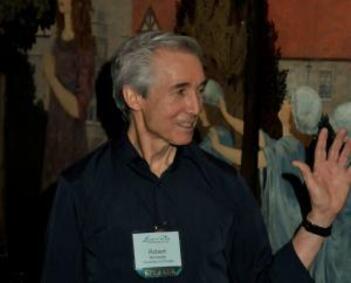
St. Louis University, PhD' 71
University of Chicago, PhD' 78
BIOGRAPHY
I do research on history and philosophy of biology and psychology, as well as on German Romanticism. This includes particular interest in evolutionary biopsychology, ethology, and sociobiology. Concerning philosophic and metahistoric problems, I have argued for a revaluation of evolutionary ethics and have developed a natural selection model for historiographic analysis. My first book treats evolutionary theories of mind and behavior. That history discusses the period from the late eighteenth century to the present, but particularly focuses on the work of Charles Darwin. Other figures that receive major attention are Herbert Spencer, George Romanes, Lloyd Morgan, William James, James Mark Baldwin, Konrad Lorenz, and Edward O. Wilson. In another book, I have traced the gradual alteration in meaning of the concept of “evolution” from the seventeenth century up to Darwin and contemporary neo-Darwinians. I argue that Darwin's own theory has a radically different character than usually thought. In another vein, I have written a history of German Romanticism during the period 1770-1830. I argue that the German Romantics held that aesthetic approaches to nature and scientific approaches were complementary, and that this conception had a powerful impact on both the art and biological science of the period. Among the figures considered are Novalis, the Schlegel brothers, Kant, Schelling, and Goethe. German evolutionary theory is the subject of my next book, with a special focus on Ernst Haeckel; he was supposed to have committed egregious fraud and produced theories that led to the rise of Nazi biology. I dispute both of these contentions. The connection between evolutionary theory and Hitler's biology is the subject of a book that examines controversies in the historiography of evolutionary biology. Recently, Michael Ruse and I have embarked on an historical and philosophical consideration of Darwin's accomplishment—we disagree profoundly. I teach courses on all of the above topics, as well as courses on the philosophy of history and ancient Greek philosophy and science.
Recent Research / Recent Publications
Co-authored with Michael Ruse. Debating Darwin. Chicago: University of Chicago Press, 2016.
Was Hitler a Darwinian? Disputed Questions in the History of Evolutionary Theory. Chicago: University of Chicago Press, 2013.
The Tragic Sense of Life: Ernst Haeckel and the Struggle over
Evolutionary Thought. Chicago: University of Chicago Press, 2008. Gordon J. Laing Prize, 2011.
The Romantic Conception of Life: Science and Philosophy in the Age of Goethe. Chicago: University of Chicago Press, 2002. Gordon J. Laing Prize, 2003.
The Meaning of Evolution: the Morphological Construction and Ideological Reconstruction of Darwin's Theory. Chicago: University of Chicago Press, 1992; paperback, 1993.
Darwin and the Emergence of Evolutionary Theories of Mind and Behavior. Chicago: University of Chicago Press, 1987; paperback, 1989. Winner of the Pfizer Prize in History of Science.
-
"The Beautiful Skulls of Schiller and the Georgian Girl: The Quantitative and Aesthetic Scaling of the Races, 1770–1850." In Johann Friedrich Blumenbach: Race and Natural History, 1750–1850, edited by Nicolaas Rupke and Gerhard Lauer. New York: Routledge, 2018.
-
"The Role of Biography in Intellectual History." KNOW: A Journal on the Formation of Knowledge 1, no. 2 (2017): 295–-318
-
"The Impact of German Romanticism on Biology in the Nineteenth Century." In The Impact of Idealism: The Legacy in Philosophy and Science, edited by Nicholas Boyle, 235–42. Cambridge: Cambridge University Press, 2013.
-
"Darwinian Enchantment." In The Joy of Secularism, edited by George Levine, 185–204. Princeton, NJ: Princeton University Press, 2011.
-
"Nature is the Poetry of Mind, or How Schelling Solved Goethe's Kantian Problems." In Kant and the Sciences, edited by Michael Friedman and Alfred Nordman. Cambridge, MA: MIT Press, 2005.
-
"Darwin's Metaphysics of Mind." In Darwin and Philosophy, edited by Vittorio Hoesle and Christian Illies, 166–80. Notre Dame: Notre Dame University Press, 2005.
-
"The Relation of Spencer's Evolutionary Theory to Darwin's." In Herbert Spencer: The Intellectual Legacy, edited by Greta Jones and Robert Peel, 17–36. London: The Galton Institute, 2004.
-
"If This Be Heresy: Haeckel's Conversion to Darwinism." In Darwinian Heresies, edited by Abigail Lusting, Robert J. Richards, and Michael Ruse, 101–30. Cambridge: Cambridge University Press, 2004.
-
"Did Friedrich Schelling Kill Auguste Böhmer and Does it Matter? Or, the Role of Biography in Intellectual History." In Biography and Historical Analysis, edited by Lloyd Ambrosius, 133–54. Lincoln: University of Nebraska Press, 2004.
-
"The Erotic Authority of Nature: Science, Art, and the Female during Goethe's Italian Journey." In The Moral Authority of Nature, edited by Lorraine Daston and Fernando Vidal, 137–54. Chicago: University of Chicago Press, 2003.
-
"The Evolution of Mind, Behavior, and Emotions." In Cambridge Companion to Darwin, edited by Jonathan Hodge and Gregory Radick. Cambridge: Cambridge University Press, 2002.
-
"The Linguistic Creation of Man: Charles Darwin, August Schleicher, Ernst Haeckel, and the Missing Link in Nineteenth-Century Evolutionary Theory." In Experimenting in Tongues: Studies in Science and Language, edited by Matthias Doerres. Stanford: Stanford University Press, 2002.
-
"Kant and Blumenbach on the Bildungstrieb Historical Misunderstanding." Studies in the History and Philosophy of Biology and Biomedical Sciences 31, no. 1 (2000): 11–32.
-
"The Epistemology of Historical Interpretation: Progressivity and Recapitulation in Darwin's Theory." In Epistemology and Biology, edited by Richard Creath and Jane Maienschein. Cambridge: Cambridge University Press, 1999.
-
"The Nature and Necessity of Cultural History of Science." The Modern Schoolman 76, no. 2/3 (January/March 1999): 221–233.
-
"Darwin's Romantic Biology, the Foundation of his Evolutionary Ethics." In Biology and the Foundation of Ethics, edited by Jane Maienschein and Michael Ruse, 113–53. Cambridge: Cambridge University Press,1999. A briefer version of this article has been distributed as the Stiernotte Lecture for 1997.
-
"Charles Darwin." In The MIT Encyclopedia of the Cognitive Sciences, edited by Robert A. Wilson and Frank C. Keil. Cambridge, MA: MIT Press, 1999.
-
"Rhapsodies on a Cat-Piano, or Johann Christian Reil and the Foundations of Romantic Psychiatry." Critical Inquiry 24, no. 3 (Spring 1998): 700–736.
-
"The Darwinian Justification of Altruism." Acta Universitatis Upsaliensis, Studies in Bioethics and Research Ethics 3 (1998): 37–50.
-
"Theological Foundations of Darwin's Theory of Evolution." In Science in Context, edited by Karen Parshall and Paul Theerman. New Brunswick, NJ: Rutgers University Press, 1996.
-
"Arguments in a Sartorial Mode, or the Asymmetries of History and Philosophy of Science." PSA 1992, Proceedings of the 1992 Biennial Meeting of the Philosophy of Science Association, vol. 2, edited by M. Forbes and D. Hull, 482–489. Lansing, MI: Philosophy of Science Association, 1993.
-
"Resistance to Constructed Belief." In Questions of Evidence, edited by J. Chandler, A. Davidson, and H. Harootunian. Chicago: University of Chicago Press, 1994.
-
"Ideology and the History of Science." Biology and Philosophy, 8 (1993): 103–108
-
"Birth, Death, and Resurrection of Evolutionary Ethics." In Evolutionary Ethics, edited by Matthew Nitecki. New York: State University of New York Press, 1993. Reprinted as "Evolutionäre Ethik, revidiert und gerechtfertigt." In Evolution und Ethik, edited by Kurt Bayertz, 168–98. Stuttgart: Reclam Verlag, 1993.
-
Co-authors Debating Darwin with Michael Ruse
-
Lectures on "Darwin and Intelligent Design: Morality in Natural Selection" at the Chicago Humanities Festival [video, 39 minutes]
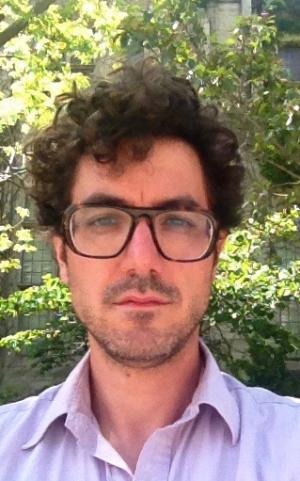
Massachusetts Institute of Technology, PhD '11
BIOGRAPHY
Michael Rossi is an historian of medicine and science in the United States from the nineteenth century to the present. His work focuses on the historical and cultural metaphysics of the body: how different people at different times understood questions of beauty, truth, falsehood, pain, pleasure, goodness, and reality vis-à-vis their corporeal selves and those of others.
His first book manuscript traces the origins of color science—the physiology, psychology, and physics of color—in the late-nineteenth-century United States to a series of questions about what modern America ought to be: about the scope of medical, scientific, and political authority over the sensing body; about the nature of aesthetic, physiological, and cultural development between individual and civilization; about the relationship between aesthetic harmony, physiological balance, and social order.
His second project looks at how linguists, anatomists, and speech pathologists moved, over the course of the twentieth century, from viewing language as a function of sound-producing organs (tongue, lips, palate, larynx, etc.) to searching for a notional “language organ” within the brains of all human beings. Such interpretative shifts in understanding human anatomy are neither an ancient phenomenon nor one limited to extreme medical specialization, but rather are ongoing issues, providing a window on the social, political, and philosophical understanding of modern bodies, medicine, and science.
Prior to Chicago, Michael was a postdoctoral fellow in the Groupe Histoire des sciences de l’homme at the Ecole Normale Superieur de Cachan in France. He received a PhD in the history and anthropology of science, technology, and society from MIT and an AB from Columbia University.
Recent Research / Recent Publications
-
Publishes The Republic of Color (University of Chicago, 2019)
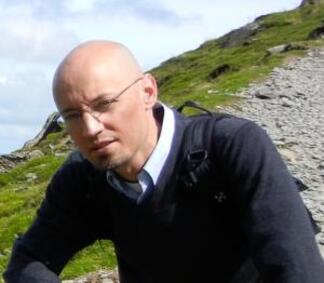
University of Chicago, PhD '05
BIOGRAPHY
My first book, Enlightenment's Frontier: the Scottish Highlands and the Origins of Environmentalism (Yale, 2013) investigates the environmental roots of the Scottish Enlightenment. What was the place of the natural world in Adam Smith's famous defense of free trade? This perspective recovers the forgotten networks of improvers and natural historians that sought to transform the soil, plants, and climate of Scotland in the eighteenth century. The Highlands offered a vast outdoor laboratory for rival liberal and conservative views of nature and society. But when the improvement schemes foundered toward the end of the century, northern Scotland instead became a crucible for anxieties about overpopulation, resource exhaustion, and the physical limits to economic growth. In this way, the rise and fall of the Enlightenment in the Highlands sheds new light on the origins of environmentalism.
My second book, Green Victorians: The Simple Life in John Ruskin's Lake District (Chicago, 2016), coauthored with Vicky Albritton, considers the problem of the Anthropocene from the perspective of a late Victorian utopian movement. Green Victorians tells the story of the first "post-carbon" society in Britain, a community in the English Lake District dedicated to Arts and Crafts industry and simple living. This experiment was galvanized by precocious anxieties about anthropogenic climate change, voiced by the eccentric polymath John Ruskin. He convinced his supporters to reject coal and steam in favor of renewable energy and labor-intensive handicraft production. By creating a new culture of sufficiency, Ruskin and his followers sought to demonstrate that a simple material life was still compatible with a great measure of cultural creativity and intellectual freedom. Green Victorians explores the radical and material experience of Ruskin's community without shying away from the darker side of the movement, including its technophobia and paternalism.
My current research deals with a set of closely related themes in environmental history, history of science, and political economy. The British Industrial Revolution saw the birth of the first fossil fuel economy. At the same time, geologists transformed the public understanding of the earth's interior and deep past. My new project sets out to show that these developments—fossil growth and fossil science—converged to produce a fundamental reorientation of politics and culture towards cheap energy and cornucopian growth.
My research has been funded by fellowships from the Institute of Historical Research in London, the Andrew W. Mellon Foundation, the Huntington Library in Los Angeles, the American Council for Learned Societies, and the Notre Dame Institute for Advanced Study.
Recent Research / Recent Publications
- Fredrik Albritton Jonsson and Carl Wennerlind, Scarcity: Economy and Nature in the Age of Capitalism, Harvard University Press, 2023.
- Coauthor with Vicky Albritton. Green Victorians: The Simple Life in John Ruskin's Lake District. Chicago: University of Chicago Press, 2016. Ruskin Society Book Prize 2016 (runner up).
- Enlightenment's Frontier: The Scottish Highlands and the Origins of Environmentalism. New Haven, CT: Yale University Press, 2013.
- Editor with John Brewer, Neil Fromer, and Frank Trentmann, Scarcity in the Modern World: History, Politics, Society and Sustainability 1800-2075, Bloomsbury Press: 2019
- “Ruskin in the Year of COVID 19,” Ruskin Birthday Reflections, Reilly Center, Notre Dame, February 8, 2021
- Contributor to Roundtable on Duncan Kelly, Politics and the Anthropocene for H-Diplo.
- “Natural History” in Old Ways New Roads, ed. Nigel Leask et al (Edinburgh: Birlinn 2021), museum catalogue for 2020 exhibition about Highland tour at the Hunterian Museum in Glasgow
- "The Coal Question Before Jevons." Historical Journal 62, no. 2 (June 2019).
- "Growth in the Anthropocene." In Scarcity in the Modern World: History, Politics, Society, and Sustainability, 1800–2075, edited by John Brewer, Neil Fromer, Fredrik Albritton Jonsson, and Frank Trentmann. London: Bloomsbury Press, 2019.
- “Roundtable: The Anthropocene in British History [with Chris Otter, Alison Bashford, John Brooke, and Jason Kelly]." Journal of British Studies 57, no. 3 (July 2018): 568–96.
- "Abundance and Scarcity in Geological Time 1784–1844." In Nature, Action, and the Future: Political Thought and the Environment, edited by Katrina Forester and Sophie Smith, 70–93. Cambridge: University of Cambridge Press, 2018.
- "Political Economy." In Historicism and the Human Sciences in Victorian Britain, edited by Mark Bevir, 154–85. Cambridge: Cambridge University Press, 2017.
- "Scottish Tobacco and Rhubarb: The Natural Order of Civil Cameralism in the Scottish Enlightenment." Eighteenth-Century Studies 49, no. 2 (Win. 2016): 129–47
- "Adam Smith and Enlightenment Studies." In Adam Smith: His Life, Thought, and Legacy, edited by Ryan Patrick Hanley, 443–60. Princeton, NJ: Princeton University Press, 2016.
- "Island, Nation, Planet: Malthus and the Enlightenment." In New Perspectives on Malthus, edited by Robert J. Mayhew, 128–54. Cambridge: Cambridge University Press, 2016.
- "Climate Change and the Retreat of the Atlantic: The Cameralist Context of Pehr Kalm's Voyage to North America 1748–51" William and Mary Quarterly 72, no. 1 (Jan. 2015).
- "The Origins of Cornucopianism: A Preliminary Genealogy." Critical Historical Studies 1, no. 1 (Spr. 2014).
- "Adam Smith in the Forest." In The Social Lives of the Forests, edited by Susanna B. Hecht, Kathleen D. Morrison, and Christine Padoch. Chicago: University of Chicago Press, 2013.
- "Natural History and Improvement: The Case of Tobacco." In Mercantilism Reimagined: Political Economy in Early Modern Britain and Its Empire, edited by Philip J. Stern and Carl Wennerlind. Oxford: Oxford University Press, 2013.
- "A History of the Species?" Review essay of Deep History: The Architecture of Past and Present, edited by Andrew Shyrock and Daniel Lord Smail, History and Theory 52, no. 3 (Oct. 2013).
- "The Industrial Revolution in the Anthropocene." Journal of Modern History 83, no. 3 (Sept. 2012).
- "Rival Ecologies of Global Commerce: Adam Smith and the Natural Historians." American Historical Review 115, no. 5 (Dec. 2010).
- "Prudence and Magnanimity: Roundtable on Ryan Hanley's Adam Smith and the Character of Virtue." The Art of Theory: Conversations in Political Philosophy (Nov. 2010).
- "Enlightened Hands: Managing Dexterity in British Medicine and Manufactures 1760–1800." In Body Parts: Critical Explorations in Corporeality, edited by Christopher Forth and Ivan Crozier. Lanham, MD: Lexington Books, 2005.
- "The Physiology of Hypochondria in Eighteenth-Century Britain." In Cultures of the Abdomen: Dietetics, Digestion, and Fat in the Modern World, edited by Christopher E. Forth and Ana Cardin-Coyne. Palgrave Macmillan, 2005.
- Co-authors "Reducing the Carbon Footprint of Academic Travel," Inside Higher Ed, Apr. 18, 2019
- Launches planetary history research project with Dipesh Chakrabarty
- Participates in Q&A on how to teach the Anthropocene, EuropeNow, with syllabus
- Discusses Amitav Ghosh’s recent book, The Great Derangement: Climate Change and the Unthinkable, in an article in the Guardian.
- Coauthors, with Vicky Albritton, Green Victorians: the Simple Life in John Ruskin's Lake District (Chicago, 2016). Ruskin Society Book Prize 2016 (runner up).
- Coorganizes "Climate Change: Disciplinary Challenges to the Humanities and Social Sciences" at the Neubauer Collegium
- Delivers the inaugural T. C. Smout Lecture in Scottish History on the "Enlightenment's Frontier: The Scottish Highlands and the Origins of Environmentalism" [audiocast, 55 minutes
- Talks at the Social Life of Forests Conference on "Invisible Forests: Natural Knowledge in the Making of Classical Economics" [video, 27 minutes]
- Co-author with Rachael Osborn, Mark Fiege and Will Wright, Amicus brief of environmental historians, Juliana v. United States, February 22, 2019.

